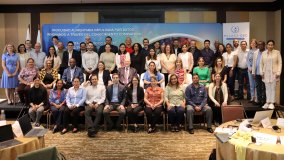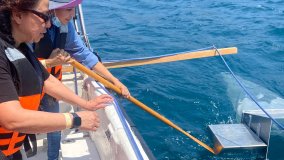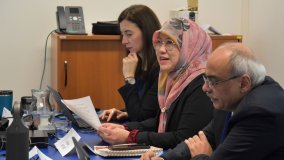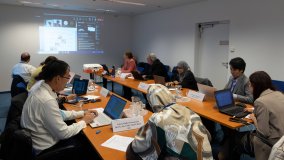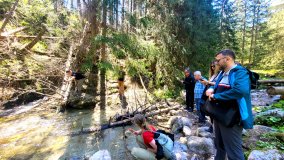1 June 2023
IAEA-supported New Data Sharing Committee to Improve Food Safety for Public Health in Latin America and the Caribbean
A new Data Sharing Committee (DSC) in Latin America and the Caribbean, supported by the IAEA, will help ensure food safety in national and regional markets, and facilitate the international trade of food products. Launched on the margins of the Latin American Congress on Pesticide Residues hosted in Panama by the Ministry of Agriculture on 25 May, this new initiative will enable the official food safety laboratories of 17 countries in the region to share analytical data for public health with the long term goal of establishing a regional preparedness system for food safety.?
5 May 2023
Addressing Microplastics Pollution: Training Course in Colombia Supports Marine Laboratories in Caribbean
Scientists and researchers from marine laboratories in the Caribbean have learned the latest techniques and methods for monitoring microplastics in marine ecosystems at an IAEA-sponsored training course, hosted by Colombia’s Institute for Marine and Coastal Research (INVEMAR) from 27 to 31 March.??
21 March 2023
Arab States Scale Up Joint Efforts to Monitor Radioactivity and Other Sources of Environmental Pollution
A new network of laboratories is to be established in countries that are party to the Cooperative Agreement for Arab States in Asia for Research, Development and Training related to Nuclear Science and Technology (ARASIA).
15 December 2022
Understanding the Scale of the Microplastics Problem: IAEA Helps Harmonize Collection Protocols
The majority of microplastics, microbeads and single-use plastics in our oceans come from land-based sources and are transported to the sea from rivers and coastlines. Today, marine plastics affect more than 800 marine species and could potentially harm human health as these plastics enter our marine food chain.
13 June 2022
Revealing Hidden Links Between Groundwater Aquifers, Climate Change and Human Activities in Europe and Central Asia
Close to 30 hydrology experts from 27 countries ?last month shared initial groundwater monitoring results at a regional coordination meeting in Krakow, Poland, as part of an IAEA technical cooperation project[1] to study the effects of climate change on groundwater aquifers in countries in Eastern Europe and Central Asia.

